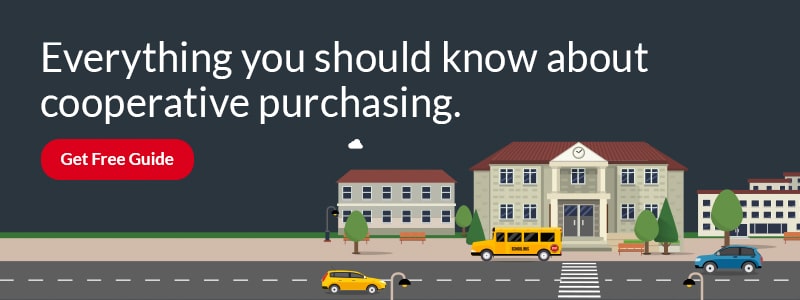Cooperative purchasing arrangements save participants millions of dollars annually.
Governments, non-profits, and private and public education are most likely to use cooperative purchasing, yet many do not make the most of the opportunities offered. Schools, in particular, can miss out on potential savings.
Keep reading to learn how your school system can make the most of its cooperative purchasing options.
What Is Cooperative Purchasing?
Simply put, cooperative purchasing is when two or more entities pool their purchasing power. They contract together with suppliers to get better pricing on items and services they need.
Purchasing cooperatives can also give participants access to things they would not otherwise be able to buy. For example, schools might not meet a supplier’s minimum purchasing requirement alone, but as part of a buying cooperative, they could gain access to that supplier and its products.
Piggybacking Contracts – Cooperative Purchasing
There are two primary types of contract purchasing arrangements.
The first is “piggybacking,” which provides a purchasing option that does not require membership in a larger purchasing organization. In these arrangements, a school adds itself to another agency’s pre-existing contract, which can give them access to services and supplies (but it does have drawbacks).
For example, the add-on school has no ability to negotiate terms or pricing. It may get better pricing than it had alone, but it may not get the best pricing available.
Joint Solicitation – Cooperative Purchasing
The second option for a contract purchasing arrangement is joint solicitation. In joint solicitation situations, qualifying parties band together in a formal agreement to maximize their purchasing power.
Often, schools can sign on to an established local or regional cooperative purchasing organization. Doing so can save tremendous time, energy and effort.
Who Can Join a Buying Cooperative?
Cooperative purchasing arrangements among businesses are fairly common. And, interestingly, organizations don’t necessarily have to be from the same type of vertical to benefit from the buying power.
In fact, purchasing cooperatives often offer services to a variety of organizations in addition to private and public school systems:
- Government agencies and entities
- Public organizations
- 501c3 nonprofit organizations
These types of organizations tend to be more aligned with schools’ needs and finances.
What Can Cooperative Purchasing Be Used to Procure?
Cooperative purchasing agreements can cover almost any product or service. This includes both standard items and things that most organizations do not think of.
Schools are often not aware that they can use joint purchasing arrangements to get good pricing on:
- Large-scale building projects, such as roofing
- Infrastructure solutions
- Insurance coverage and outsourced services
In fact, it is in these larger but less well-known areas that contract purchasing can provide the most benefit.
Other Benefits of Contract Purchasing
Contract purchasing helps schools save money through competitive pricing and can also lessen the burden in other ways (that might be less tangible).
Efficiency
In most cases, schools are required to use an RFP process to procure items that they need. This process can be time- and energy-consuming. It generally involves:
- Creating specifications for every item
- Writing and issuing an RFP
- Reviewing suppliers’ proposals
- Selecting the best offer
- Negotiating, writing and signing contracts
Purchasing through a regional or national buying cooperative eliminates most of these steps. Instead, schools contract with the purchasing group and can then order from any supplier approved by the group. This saves large amounts of time, money and energy.
Compliance
Schools purchasing products and services independently are responsible for ensuring their purchases comply with all applicable rules. This includes federal, state, and local regulations. Purchasing unapproved items can quickly cause huge problems.
Cooperative contracts take these legal requirements into account upfront, which means schools are able to buy from suppliers without worrying about compliance. (This also saves time and energy for school personnel and reduces the likelihood of costly mistakes.)
Flexibility
Schools locked into private contracts with suppliers have very little flexibility and negotiation power. Schools in piggybacking arrangements have a little more wiggle room, but still not nearly as much as schools in joint purchasing arrangements.
Cooperative purchasing organizations consistently get the best deals on everything their members need.
Reliability and Support
Suppliers and service providers are deeply invested in keeping joint purchasing contracts because these organizations bring in a steady stream of business and have an outsized impact on their business’s reputation and profitability.
Participating in a purchasing cooperative gives schools added weight. Instead of being a single, small client, they carry the whole value of the contract with them. This can make providers more attentive and responsive to concerns, complaints and requests for customer support.
When schools do encounter issues, they are also not on their own to handle them. Buying cooperatives employ staff and partner organizations who can assist, which can lead to quicker, easier and more satisfactory resolutions.
Getting Started With Cooperative Purchasing
Finding cooperative purchasing opportunities for your school is easier than you might think.
Contact your local government or regional support agencies (such as the Better Business Bureau) to ask around, or even reach out to your trusted suppliers to see if they work with any such groups.
At TEMA Roofing Services, we are proud to work hand in hand with both OMNIA Partners (one of the most experienced cooperative purchasing organization for state and local government, K-12 education, colleges and universities) and The Interlocal Purchasing System (TIPS) (managed by the Region 8 Education Service Center).
A cooperative purchasing partnership – which is often free – can be a great way to get better deals from suppliers you already work with and trust. Take some time to research and find the best buying cooperative for your school system, and benefit for decades to come.






